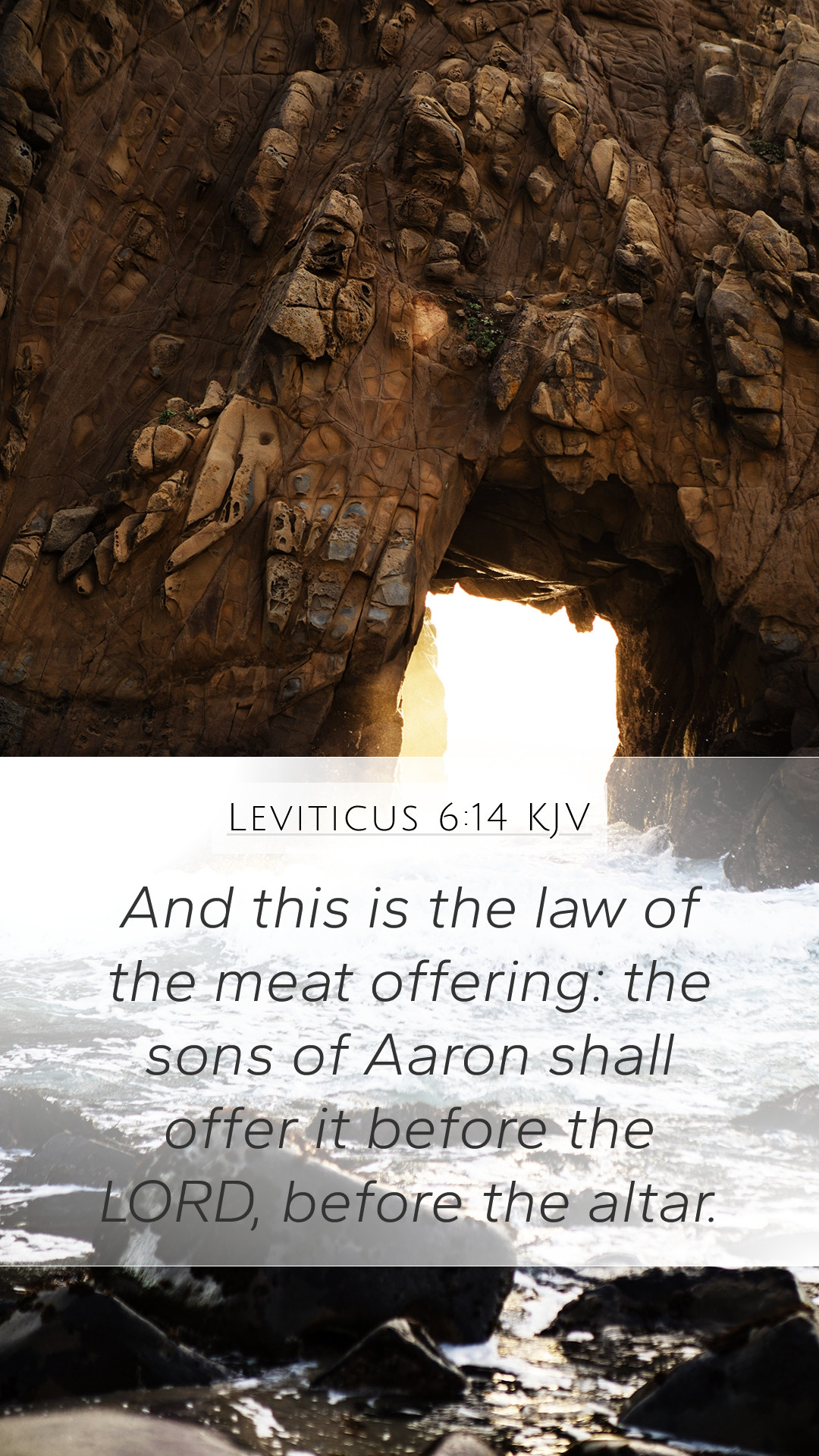Understanding Leviticus 6:14
Leviticus 6:14 states: "And this is the law of the meat offering: the sons of Aaron shall offer it before the LORD, before the altar."
This verse serves as an introduction to the regulations regarding the grain or meat offerings that were to be presented to the Lord in the Tabernacle worship. Within this context, it highlights the role of the priests, specifically the sons of Aaron, in the sacrificial system established for the Israelites.
Bible Verse Meaning
Bible verse meanings help deepen our understanding of God's Word. Here’s a combined explanation from public domain commentaries:
-
Matthew Henry's Commentary:
Henry emphasizes that the meat offering is meant to symbolize the dedication of oneself in service to God. It is a means of acknowledging God’s provision in one's life. The phrase “before the Lord” signifies that these offerings are not merely ritualistic; they are acts of worship directed toward God Himself.
-
Albert Barnes' Notes:
Barnes highlights that the meat offering is unique as it is an expression of gratitude and commitment. The involvement of Aaron’s sons as the officiating priests points to the ordained nature of worship. This reflects the importance of adherence to the prescribed order of worship in the community of faith.
-
Adam Clarke's Commentary:
Clarke discusses the necessity of these offerings in the covenant relationship between God and His people. He notes that such offerings are not merely for atonement but for expressing devotion and gratitude toward God. The direct involvement of Aaron's lineage emphasizes the sacredness of the priestly role and the seriousness of their duties in approaching God.
Historical Context and Significance
Understanding Scripture, especially within a historical context, is crucial for accurate interpretation. The Book of Leviticus, written during the Israelites' journey in the wilderness, establishes essential guidelines for worship and societal living. This chapter appears amidst various instructions about offerings, reinforcing the theme of holiness and the necessity of taking worship seriously.
Key Elements of Leviticus 6:14:
- Law of the Meat Offering: This specifies a requirement of ritual sacrifice associated with grain or food, indicating that all aspects of life can be offered to God.
- Role of Priests: It underscores the responsibility given to Aaron’s descendants, emphasizing a divinely appointed leadership in worship.
- Divine Presence: The phrase “before the LORD” signifies that worship and offerings are to be acknowledged in a sacred space where God’s presence dwells.
Practical Applications
How to interpret Bible verses like Leviticus 6:14 can influence daily life and spiritual practice:
- Dedication of Resources: Just as the meat offering represented a portion of harvest, believers are encouraged to dedicate their talents, time, and resources to God.
- Worship and Service: Individuals must see every act of worship and service as personally significant, much like the priests’ roles in ancient Israel.
- Understanding Holiness: The necessity of offerings reminds believers of the importance of approaching God with reverence and the sacredness of their relationship with Him.
Bible Cross References:
- Exodus 29:22-25 - Concerning offerings for consecration.
- Leviticus 2:1-2 - Details on the meat offering itself and its preparation.
- Numbers 18:12 - The priests’ entitlement to a portion of the offerings.
Conclusion
In conclusion, Leviticus 6:14 is not merely an ancient rule; it serves as a foundational element in understanding God’s expectations of His people in worship. Bible verse explanations such as this one illustrate the significance of offerings, the role of the priesthood, and the importance of approaching God with reverence in the light of scriptural analysis.


